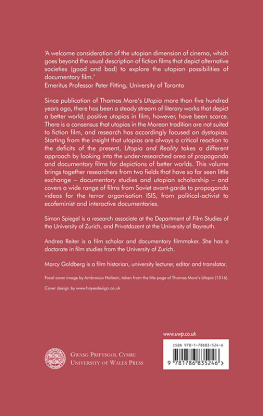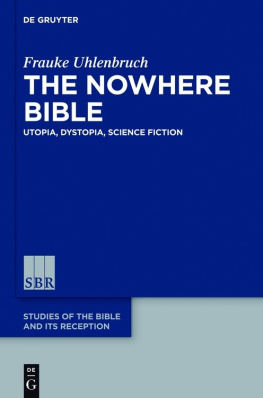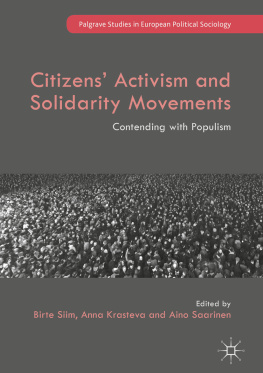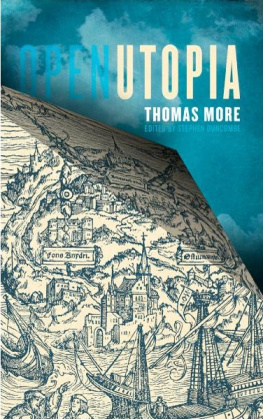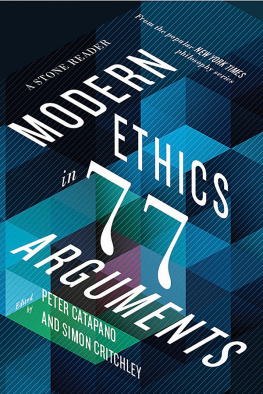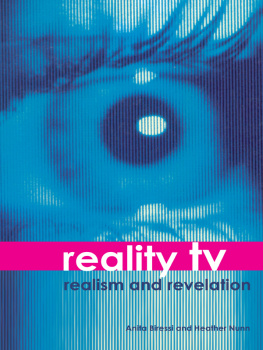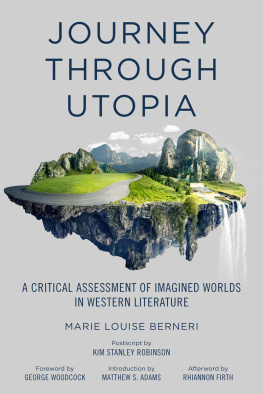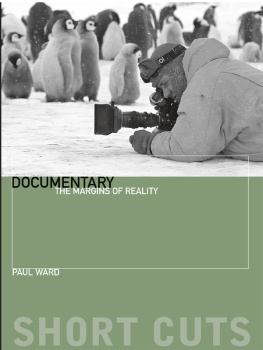Simon Spiegel (editor) - Utopia and reality : documentary, activism and imagined worlds
Here you can read online Simon Spiegel (editor) - Utopia and reality : documentary, activism and imagined worlds full text of the book (entire story) in english for free. Download pdf and epub, get meaning, cover and reviews about this ebook. year: 2020, genre: Romance novel. Description of the work, (preface) as well as reviews are available. Best literature library LitArk.com created for fans of good reading and offers a wide selection of genres:
Romance novel
Science fiction
Adventure
Detective
Science
History
Home and family
Prose
Art
Politics
Computer
Non-fiction
Religion
Business
Children
Humor
Choose a favorite category and find really read worthwhile books. Enjoy immersion in the world of imagination, feel the emotions of the characters or learn something new for yourself, make an fascinating discovery.
- Book:Utopia and reality : documentary, activism and imagined worlds
- Author:
- Genre:
- Year:2020
- Rating:3 / 5
- Favourites:Add to favourites
- Your mark:
- 60
- 1
- 2
- 3
- 4
- 5
Utopia and reality : documentary, activism and imagined worlds: summary, description and annotation
We offer to read an annotation, description, summary or preface (depends on what the author of the book "Utopia and reality : documentary, activism and imagined worlds" wrote himself). If you haven't found the necessary information about the book — write in the comments, we will try to find it.
Utopia and reality : documentary, activism and imagined worlds — read online for free the complete book (whole text) full work
Below is the text of the book, divided by pages. System saving the place of the last page read, allows you to conveniently read the book "Utopia and reality : documentary, activism and imagined worlds" online for free, without having to search again every time where you left off. Put a bookmark, and you can go to the page where you finished reading at any time.
Font size:
Interval:
Bookmark:

Utopia and Reality
Series Editors
Professor Pawel Frelik
University of Warsaw
Professor Patrick B. Sharp
California State University, Los Angeles
Editorial Board
Grace Dillon
Portland State University
Tanya Krzywinska
Falmouth University
Isiah Lavender III
Louisiana State University
Roger Luckhurst
Birkbeck University of London
John Rieder
University of Hawaii
Utopia and Reality
Documentary, Activism and Imagined Worlds
Edited by
Simon Spiegel, Andrea Reiter and Marcy Goldberg

The Contributors, 2020
All rights reserved. No part of this book may be reproduced in any material form (including photocopying or storing it in any medium by electronic means and whether or not transiently or incidentally to some other use of this publication) without the written permission of the copyright owner except in accordance with the provisions of the Copyright, Designs and Patents Act 1988. Applications for the copyright owners written permission to reproduce any part of this publication should be addressed to the University of Wales Press, University Registry, King Edward VII Avenue, Cardiff CF10 3NS.
www.uwp.co.uk
British Library CIP Data
A catalogue record for this book is available from the British Library.
ISBN: 978-1-78683-524-6
eISBN: 978-1-78683-526-0
The rights of the Contributors to be identified as authors of this work have been asserted in accordance with sections 77 and 79 of the Copyright, Designs and Patents Act 1988.
The publisher has no responsibility for the persistence or accuracy of URLs for any external or third-party internet websites referred to in this book, and does not guarantee that any content on such websites is, or will remain, accurate or appropriate.
Cover design by www.hayesdesign.co.uk
Series Editors Preface
Science fiction (SF) is a global storytelling form of techno-scientific modernity which conveys distinct experiences with science, technology and society to a wide range of readers across centuries, continents and cultures. The New Dimensions in Science Fiction series aims to capture the dynamic, worldwide and media-spanning dimensions of SF storytelling and criticism by providing a venue for scholars from multiple disciplines to explore their ideas on the relations of science and society as expressed in SF.
Jane M. Gaines is Professor of film at Columbia University and author of three award-winning books. In 2018 she was given the Distinguished Career Award from the Society for Cinema and Media Studies.
Marcy Goldberg is a freelance film historian, media consultant, university lecturer and translator based in Zurich.
Matthew Holtmeier is Assistant Professor and Co-director of the film studies minor at East Tennessee State University. He is the author of Contemporary Political Cinema (Edinburgh University Press, 2019).
Dale Hudson is Associate Professor in the film and new media programme at New York University Abu Dhabi.
Susanna Layh is Senior Lecturer at the Chair of Comparative Literature at the University of Augsburg, Germany.
Klearjos Eduardo Papanicolaou is a filmmaker and researcher based in Zurich, where he teaches urban research methods and film-making at ETHZ, and collaborates with the interdisciplinary design studio Urban-Think Tank.
Andrea Reiter is a film scholar and documentary filmmaker. Her book Kritik, Aktivismus und Prospektivitt, based on her PhD, was published in autumn 2019 with Schren.
Lyman Tower Sargent is Professor Emeritus of political science at the University of Missouri-St Louis. He was the founding editor of Utopian Studies and author of Utopianism: A Very Short Introduction (Oxford University Press, 2010) as well as over a hundred articles on various aspects of utopianism.
Daniel Schwartz is a filmmaker and artist from Atlanta, currently living in Zurich. His work focuses primarily on urban transformation from social, spatial and political perspectives.
Peter Seyferth is a political philosopher from Munich. From 2003 to 2016 he taught political science at Ludwig-Maximilians-Universitt and Technische Universitt Munich. He now works for FernUniversitt in Hagen.
Simon Spiegel is a lecturer at the Department of Film Studies at the University of Zurich and Privatdozent at the University of Bayreuth. He is the author of Bilder einer besseren Welt (Marburg: Schren, 2019).
Chelsea Wessels is Assistant Professor and Co-director of the film studies minor at East Tennessee State University. Her research interests include local cinema history and the archive, global film genres and feminist film.
This volume has its origins in an international conference that took place at the Department of Film Studies at the University of Zurich in the autumn of 2016, on the occasion of the 500th anniversary of the original publication of Thomas Mores Utopia. This conference, titled Utopia and Reality, grew out of the research project Alternative Worlds: The Political-activist Documentary Film, which was generously funded by the Swiss National Science Foundation. The national doctoral programme Film, Photography, and Other Visual Media (Swissuniversities) co-funded the event, which brought together international researchers from two fields that normally see little exchange utopian studies and documentary research. While some of the scholars who presented at the conference are part of this volume, the participants also included Jens Eder, Britta Hartmann, Dina Iordanova, Chris Tedjasukmana, Thomas Tode and Lars Weckbecker. The conference was accompanied by a film programme at the Xenix cinema curated by Thomas Tode.
The unusual encounter proved highly stimulating and confirmed our assumption that documentary and utopian studies have a lot to learn from each other. The publication of a collective volume that puts some of the insights from the workshop on record while also expanding on them was the logical next step. For this, we widened the focus and invited additional scholars to complement the original contributions.
We would like to thank Margrit Trhler, professor at the University of Zurich, who led the original research project and without whose support both the conference and the ensuing volume would have remained utopian projects. We would also like to thank Barbara Bitterli for her tireless help in organising the conference, Viola Zimmermann for her beautiful artwork, Jenny Billeter and Reto Bhler from the Xenix cinema for their hospitality and Susie Trenka for her diligent proofreading. Patricia Zimmermann was instrumental in establishing contacts with additional authors who were not part of the original conference and whose articles complement the present volume.
Patrick Sharp and Pawel Frelik, editors of the New Dimensions in Science Fiction book series, immediately took an interest in our project and were of great help throughout the process. Special thanks go to Sarah Lewis of University of Wales Press for shepherding us through all the stages of the publishing process.
Andrea Reiter and Simon Spiegel
The utopian novel boasts a long and venerable tradition. In 1516, more than 500 years ago, the humanist Thomas More wrote his
Font size:
Interval:
Bookmark:
Similar books «Utopia and reality : documentary, activism and imagined worlds»
Look at similar books to Utopia and reality : documentary, activism and imagined worlds. We have selected literature similar in name and meaning in the hope of providing readers with more options to find new, interesting, not yet read works.
Discussion, reviews of the book Utopia and reality : documentary, activism and imagined worlds and just readers' own opinions. Leave your comments, write what you think about the work, its meaning or the main characters. Specify what exactly you liked and what you didn't like, and why you think so.

